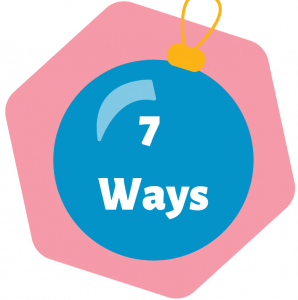7 ways to make Christmas more manageable for an autistic person
Posted on
Written by Amaze employee and autistic adult Joel Wilson
Christmas can be a stressful time of year. It’s also very overwhelming trying to find what works best for you, your child, or the autistic people around you. There is no lost that will make everything stress-free, but I’ve tried my best to share my experiences of what works well. Hope it helps!
My Christmas
This year will be a quiet one for me. I’ll get up in the morning, have breakfast, chill with my cats for a bit, maybe watch some TV, etc. At some stage, my neighbour will open his side gate and that’ll be an open invitation for me to come and go as I like. It’ll just be him, his wife, his mother-in-law and their two dogs. There’ll be food, drinks and chilled out conversation. I’ll then eventually go back to my house, give my cats some chicken and milk and then go to sleep. I’ve also organised to give some kids I work with presents the following week.
My suggestions
While 85% of Australians know an autistic person, only 4% understand how to support an autistic person. My personal experiences have taught me there’s a few things you can do to make Christmas more manageable for an autistic person. Here’s seven of them:
- 1. Everyone needs to accept each other for who they are. Christmas can already be tough when families get together and different personalities clash. Accepting an autistic person as autistic can prevent any unneeded, extra stress.
- 2. Managing Christmas stressors isn’t much different to any other day, there’s just usually more people and noises which can make things harder. So if an autistic person wants to have headphones on, use a sensory toy or even chill in their room until it’s time to eat or open presents or because they’re feeling overwhelmed, just let them.
- 3. Stick to set times for things like presents and eating. It may not be an easy task, but if an autistic person knows when something will start they’re more likely to manage how uncomfortable they feel. It can be easier to have a set start time and when an autistic person gets overwhelmed let them leave the environment.
- 4. Communicate with the autistic person. They may not be able to have their usual set routine, for example: having dinner at 6:30pm, a shower at 7:15pm and in bed at 8pm. They also might not realise how many people will be around on the day, travel requirements and other changes to their routine. Advance conversations and planning how the day might look can be really beneficial.
- 5. Keep in mind what you already know from previous Christmases, birthdays and other events. There might be some foods or drinks that autistic people have trouble processing. Maybe they don’t like the sound of knives on plates or the pops of Christmas crackers. An example of how you can work around this could be letting the person know that it’s going to be loud for a few minutes and that it’s okay for them to leave and you’ll come get them when it’s stopped. Of course, this is something that will depend on the individual person, so again I really want to say that communication and knowing is key.
- 6. If your Christmas day won’t be at home, plan somewhere that can be a sensory relaxing area. Sensory processing doesn’t just mean overwhelming sensory environments, it also includes sensory stimulation seeking—some autistic people seek a stimulating environment. Having a room or space where an autistic person can be themselves, whether it be taking time out and resting or running around throwing things, is really important for the individual to be able to recharge to continue with the day.
- 7. If you’re on your own this Christmas, do things that make you happy. There’s nothing wrong with spending Christmas on your own, but remember to take some self-care steps and look after yourself. Whether it’s cooking your favourite meal and watching Netflix or getting a small roast and doing some art, do things that help you relax. I’ve had many Christmases on my own, and whilst it can be hard, it just becomes a day like any other.
There’s a lot more I could talk about, however I feel the above are the most important tips.
Don’t forget if you or your child get overwhelmed there’s people you or they can chat to.
Kids Helpline
24/7
Phone: 1800 55 1800
Email: [email protected]
Web chat: https://kidshelpline.com.au/
Parentline Victoria
8am-midnight every day, including public holidays
Phone: 13 22 89
Beyondblue
24/7
Phone: 1300 22 4636
Web chat: www.beyondblue.org.au